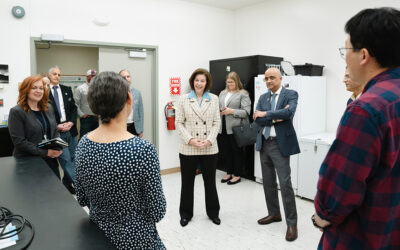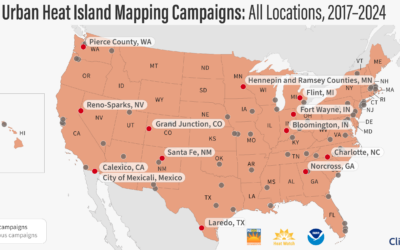Building upon past research and introducing different modeling techniques, this study will help to project extreme heat risk in coastal communities.
HOUSTON, TX (June 29, 2021) – The Desert Research Institute (DRI) and the Houston Advanced Research Center (HARC) announce the launch of a comprehensive extreme heat risk modeling project funded by the National Oceanic and Atmospheric Administration (NOAA) to study and predict the risk of extreme heat within coastal communities.
Texans along the Gulf Coast are more than familiar with the extreme heat during the long summer days. But how high will future temperatures rise and what areas will be most impacted by these changes? How does sea breeze influence heat forecasts for these communities along the coast? A joint study conducted by DRI and HARC seeks to answer these questions by developing a modeling framework for urban heat in coastal cities and using machine learning to analyze multiple datasets to better project what will occur.
“We will quantify how urban temperature will be impacted by different urban heat mitigation strategies contemplated in the Houston’s Climate Adaptation Plan (2020) and Resilient Houston (2020) reports,” stated DRI Associate Research Professor Dr. John Mejia. “Strategies include the cooling effect of greening the city and widespread use of rooftop solar panels. We will also assess the potential warming effect of converting open spaces to new developments. We hope that our results can provide tangible information for decision-making to increase resilience to extreme heat events across economic sectors.”
Extreme heat in urban areas presents society with significant economic, health, safety, and security challenges. As part of the NOAA Climate Program Office’s (CPO) Extreme Heat Risk Initiative, this research project will address extreme heat along the coast and how communities may better prepare for the impacts.
“Building upon the existing data to model these projections will help coastal communities better understand the risk and impacts associated with extreme heat,” states Dr. Ebrahim Eslami, Research Scientist, HARC. “The end report will be a guide to help prepare for the warmer days ahead.”
Understanding the modeling uncertainties, such as the role of land and sea breezes, in the prediction of extreme heat is a standing scientific challenge. This research project will use new observationally-based products and cutting-edge high-resolution modeling to better characterize the urban Heat Index for forecasting and planning times scales in coastal communities. The Greater Houston area will serve as a testbed for this project and modeling framework, which could be applied to other cities influenced by large water bodies both in the nation and worldwide.
The two-year study will culminate in a report compiling the analyses in the summer of 2023. For more information, please visit www.cpo.noaa.gov.
###
About DRI
DRI is a recognized world leader in basic and applied environmental research. Committed to scientific excellence and integrity, DRI faculty, students, and staff have developed scientific knowledge and innovative technologies in research projects around the globe. Since 1959, DRI’s research has advanced scientific knowledge, supported Nevada’s diversifying economy, provided science-based educational opportunities, and informed policymakers, business leaders, and community members. With campuses in Reno and Las Vegas, DRI serves as the non-profit research arm of the Nevada System of Higher Education.
About HARC
HARC is a nonprofit research hub providing independent analysis on energy, air, and water issues to people seeking scientific answers. Its research activities support the implementation of policies and technologies that promote sustainability based on scientific principles. HARC is a 501(c)(3) nonprofit organization building a sustainable future in which people thrive and nature flourishes. For further information, contact HARC at (281) 364-6000 or visit www.HARCresearch.org. Connect with HARC, via Instagram, LinkedIn, Facebook or Twitter. Like or follow @HARCresearch.


